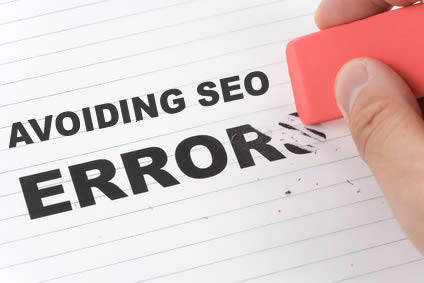Despite the notion that SEO is simple, one mistake from syntax or a flawed setting could take weeks for a website to recover. Be warned, SEO is more than just writing content, building links and changing meta tags.
Just remember Murphy’s law when implementing modifications and take precautions, such as backing things up and logging changes “just in case”. SEO involves a holistic understanding of how the whole is greater than the sum of its parts and making frivolous changes all have an impact which could inadvertently rank or tank a website.
Implementing SEO tactics on a level that transcends obviousness requires an understanding of a vast array of intricacies which all culminate across multiple metrics. For example, one unclosed tag or error in code could unravel a website and send rankings plummeting unless corrected; and the longer it is before you catch the mistake, the longer it will take to get re-indexed by search engines…
To fathom the administrative mindset, consider that each layer of optimization has a unique skill set and degree of mastery required to perfect its application to produce the right effect at the right time. This type of administrative intelligence is not always second nature, it is based on testing, trial and error, analysis of the results and the experience to “KNOW” what to do, when to do it and why.
However the reality is, it is more a point about competence, experience and observation…
You have to know what to look for before you can fix it, which takes analysis, but analysis without experience means you may not be able to identify what you are looking at which goes back to competence.
SEO techniques may be obvious, but the reason behind when to use them or why one tactic or technique is more appropriate than another. For example, say you are using a shopping cart for eccommerce. The website is already going to be challenged by components of duplicity and duplicate content across multiple pages due to the inherent nature of the shopping cart to simply “swap out” the descriptions and titles but leave everything else intact.
If you knew better, you would consolidate link flow to one category page which would then feed your child / subordinate pages such as make, model, color or manufacturer. This would be obvious to a developer or SEO who had experimented with various formats or settings and made enough mistakes to learn from to optimize the entire site properly.
What if that same shopping cart performed revisions to your site architecture, but there were settings within the CMS system and other manual settings from other areas of your website. Simple quandaries such as broken links, a robots.txt file being overwritten or a .htaccess file conflicting with other settings could put a major crimp in sales.
Under the same premise, a less experienced individual could potentially deindex a site, undermine the sites trust from creating mass 404 errors without even being aware it occurred in the first place.
The point is, specialists exist for a reason, they are familiar with the various nuances that could potentially arise and have a number of workarounds they can implement to produce the same end-result. The example of modifying critical files that affect server settings may have been a but excessive, but the point still rings true.
What about changing a title on a page or removing a link? What possible impact could that have on rankings. The answer, it depends on (a) which page (b) how long it was indexed and passing link flow to other pages (c) if it was integral to the vital link ecosystem of the site (such as supporting a landing page or other top level page) and (d) what that page is intended to rank for.
The gist of the post is, for every change you make, there are repercussions; and just to change things without structure, rhyme or reason could leave you in a quandary when something breaks and those ever so important details that may have been overlooked are now the root cause in a daisy-chain of unfortunate events.
For example, When you are dealing with keywords it pretty straight forward. Its either a keyword that (1) you haven’t identified or optimized yet (2) a keyword in process meaning on its way up the ladder on the way to the top 10 or (3) a keyword that has already passed the tipping point and is in the top 10 and you have zeroed in on another variant or related key phrase.
Depending on which one it is, there are different ways to cultivate the results such as (a) creating and cultivating more content in the instance of #1 to provide structured layers of topical content (b) adding sufficient internal or external links to increase rankings for #2 or (c) testing conversion on segmented landing pages to get the highest ROI in the case of #3 to get the most out of optimization efforts.
The ball pen hammer approach to “make it work” vs. using the right tool for the job “like a screwdriver instead” are all experiences gained at the expense of experimentation and / or deliberate programming.
So, before you go in and make changes to settings, revise content or dabble with a sites settings that have already been optimized. Take it from someone with experience, experiment on new pages, test the results and then apply what works on a larger scale if it works without creating other consequences.
We spend enough time fixing other peoples mistakes, who may have had the best intentions while they made them, but just like trying to change your own oil with the wrong tools. One missed step like forgetting a bolt during reassembly could cost you a motor if the oil leaks out.
SEO is a process that takes time to reach full potential. Understand that it involves layering processes for days, weeks, months or years, depending on the keywords.
So, to pull up the roots just to see if the plant is growing means you have to plant it again and let new roots dig in. Much in the same way, you have to cultivate a website holistically bridging relevance across multiple nodes (site architecture, content, server settings, link building and social media engagement, conversion optimization and analytics, usability testing) the list goes on and on.
The term itself may imply the objective of achieving higher rankings for specific keywords and / or key phrases, but in reality SEO is about developing an authoritative domain capable of supplanting a competitors less optimized website.
To do that, it goes back to the details and each one matters, so, if you are paying a specialist for SEO services, then respect their methodologies, time lines and techniques. What may not be obvious now, will become a reality later, which you can measure to gauge the effectiveness of a campaign.










Great Article. It is very informative and on point. I work in a web site design company and i will recommend it to my partners. Thanks!
Thanks for this information. Nice to meet you. See you again.
Double check your Meta tags before getting index, its better than waiting in frustration for google to reindex
Great article, as one who is in the web development industry I will definitely be passing the information along! Thanks for the post.